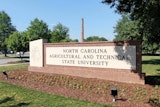When it comes to college, the odds are stacked against students like me. Neither of my parents went to college – my dad didn’t even graduate high school – and we live in a rural part of South Carolina, where college and career opportunities are harder to come by unless you’re willing and able to travel far distances.
Growing up in a small town has its perks. I graduated in a class of 178 – small enough to enjoy a really tight-knit community and have lots of chances for local leadership. I was a drum major and headed up our marches on the Fourth of July and other holidays.
On the other hand, attending a small, rural school does come with its disadvantages. They usually don’t have the same resources and opportunities that bigger, more suburban schools do. And because of that, they don’t hold as many – if any – college fairs or host college recruiters.
I’m not just speaking from my own experience, either. A UCLA and University of Arizona study found that universities send recruiters to areas with average family incomes of $100,000-plus and overlook areas with average family incomes of $70,000 or less, which is pretty common in rural America.
 Irvin Espinoza
Irvin EspinozaNow, I’m a freshman studying aerospace engineering at Embry-Riddle Aeronautical University, on scholarship from Boeing. Some might say I’m lucky, but I wouldn’t say I got to where I am now because of luck. I got here because I knew from an early age that I was interested in this field, my school helped confirm my interest – I was able to get my remote pilot’s license, thanks to our school’s drone program – and my school helped me sign up for South Carolina’s STEM Signing Day via Tallo, a LinkedIn-style social media platform where students create profiles sharing their interests, clubs, test scores and work experience, information that is shared with college and business recruiters.
STEM Signing Day was put on by Boeing, BMW, Tallo and the South Carolina Manufacturers Alliance. It invited students from across the state to participate in a signing honoring their commitment to studying STEM for the next two to four years. It was also where I learned about the Boeing Scholars program, an initiative by Boeing that provides scholarships to high school students who want to study aviation science at Embry-Riddle.
I sent in an application, and then the good news came in: I was awarded $5,000 to attend Embry-Riddle as a Boeing Scholar.
As a first-generation college student from rural America, I’ll be forever grateful for my high school helping me find this opportunity, one I probably would have never heard about or pursued. Thanks to my experience with Boeing, I’ll also always encourage employers to start interacting with students sooner, so that whether they’re interested in engineering, healthcare, agriculture or any other field, students will have someone to go to to ask questions and maybe even get financial support. With all the technology we have today, I know that employers can do it. And I know that by encouraging students to connect with employers via online platforms, schools can help students like me achieve what we thought “just wasn’t in the cards” for us.
It’s so important that they do that. Rural students from working-class families have so much talent to offer – talent that college recruiters are overlooking – and if their schools can help them use online platforms to see the many opportunities that exist in their small town and beyond, maybe that will someday change. Maybe rural students will finally get the time and attention they deserve, and be awarded the same opportunities that bigger-city students tend to get.
Irvin Espinoza is a freshman at Embry-Riddle Aeronautical University and a Boeing Scholar.















